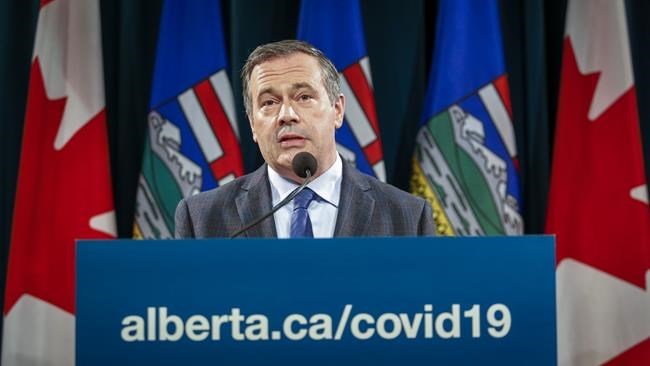EDMONTON — Alberta is getting offers of medical help from Ontario and Newfoundland and Labrador as it continues to grapple with a COVID-19 surge that could buckle its health system in a little more than a week.
Dr. Verna Yiu, the head of Alberta Health Services (AHS), said the province is in talks with the Ontario government to help deal with an intensive care system that is operating 155 per cent over normal capacity.
"Ontario has graciously offered their help, and we're in discussions with them regarding potential transfer of patients if needed," Yiu said Thursday.
Newfoundland and Labrador Premier Andrew Furey also offered aid in a statement on Twitter.
“The provinces of Newfoundland and Labrador and Alberta have long had close ties, with so many travelling back and forth for work or visits with family," Furey said.
“I spoke with Premier [Jason] Kenny today to offer any support we can provide in their battle against COVID-19. We are all united.”
Yiu said Alberta is also talking with British Columbia and Manitoba, and plans to reach out to Quebec.
She said, in the meantime, they are converting as many beds and spaces for intensive care as possible, including operating rooms.
B.C. Health Minister Adrian Dix said on Twitter that, given current demands on his province's health system, it will not be able to take any Alberta patients at this time.
There have been massive cancellations of non-urgent surgery across Alberta as staff are reassigned to COVID care.
Yiu said AHS has also begun briefing staff on how the triage protocol would work if necessary as an "absolute, absolute last resort."
Under triage protocol, physicians will have to ration life-saving equipment and resources, effectively deciding who lives and who is left to die.
She said they are getting 18 new COVID intensive care patients every day.
COVID-19 cases in Alberta began surging after Kenney lifted almost all health restrictions in the province on July 1, announcing that the battle was over and that they didn't foresee hospital cases rising to alarming levels again.
Alberta has regularly seen more than 1,000 new COVID cases a day for weeks. There were 18,706 active cases reported Thursday and 10 more deaths. There were 896 people in hospital, including 222 in ICU.
Kenney said Wednesday that without changes, the hospitals will run out of ICU space and staff in 10 days.
In Calgary, Opposition NDP Leader Rachel Notley presented internal AHS numbers that show those predictions might be too optimistic.
“These AHS projections are based on an ICU admission rate that's lower than what we've seen in the past few days,” Notley said.
"I am truly sick at heart to think of vulnerable Albertans being taken so far from home and so far from their families, but now we must ask for the help of other Canadian provinces, those with governments who took a more responsible approach to reopening."
Also Thursday, municipalities, schools, and businesses began to grapple with understanding the new gathering rules and capacity limits introduced by Kenney.
Some of those began Thursday, with a form of vaccine passport to start Monday.
At least eight post-secondary schools cancelled in-person classes through the end of the week.
Kenney implemented the restrictions to reduce the spread of COVID-19, but there will be some exemptions for institutions and businesses that sign up for the vaccine passport program.
Those that sign up for it, including restaurants, retailers, and entertainment venues, will only be allowed to host vaccinated people. Those that don't sign up will have to adhere to restrictions, such as one-third customer capacity or, in the case of restaurants, outdoor seating only.
Kenney has been whipsawed by members of his own United Conservative Party (UCP) caucus, some urging him to take more action to contain the virus, while others questioned the fairness of measures such as vaccine passports.
One of his backbenchers, Richard Gotfried, without calling Kenney out by name, accused him and the government of inexcusable delays that will now add to Albertans' suffering.
"We clearly had 30 days' notice that a crisis was looming, and nothing was done while we lacked any leadership at the helm," wrote Gotfried on his Facebook page.
"It will cost us lives and I am gutted by the lack of responsiveness to unequivocal advocacy and clear warning signals."
Alberta and Saskatchewan have resisted introducing vaccine passports but have also lagged behind other provinces in getting people vaccinated. Alberta has fewer than 72 per cent of its eligible population fully vaccinated.
Saskatchewan Premier Scott Moe announced Thursday his province will now require proof of vaccination to try to increase the number of people immunized.
This report by The Canadian Press was first published Sept. 16, 2021.
Dean Bennett, The Canadian Press



